Dill pickles represent one of the staple foods of Czech cuisine. They are canned in sharp sweet and sour brine with the addition of fresh dill, onion, carrot, and aromatic spices. You can easily make these crispy Czech-style dill pickles at home. Just follow the canning recipe below with detailed instructions.
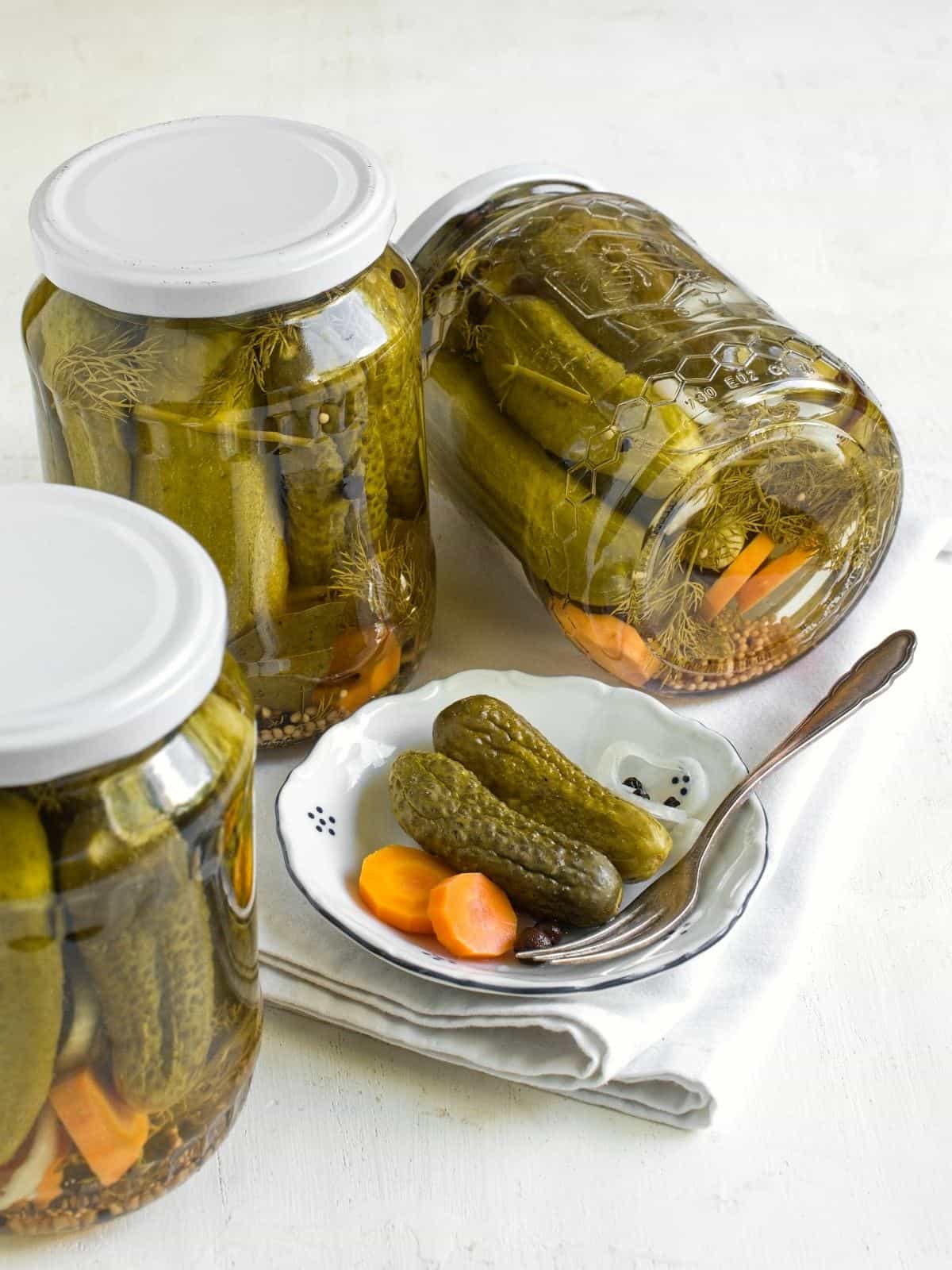
➜ About this dill pickle recipe
This is a Czech specialty where small garden cucumbers are packed into jars and covered with pre-cooked brine made of water, vinegar, salt, and sugar. The jars are sealed with a screw cap and sterilized in a boiling water bath.
I recommend monitoring the hot water temperature with a canning thermometer to ensure that the cucumbers are correctly preserved.
MY TIP: Have you got a lot of tomatoes and are wondering what to do with them? Try homemade ketchup!
➜ What cucumbers are best for pickles?
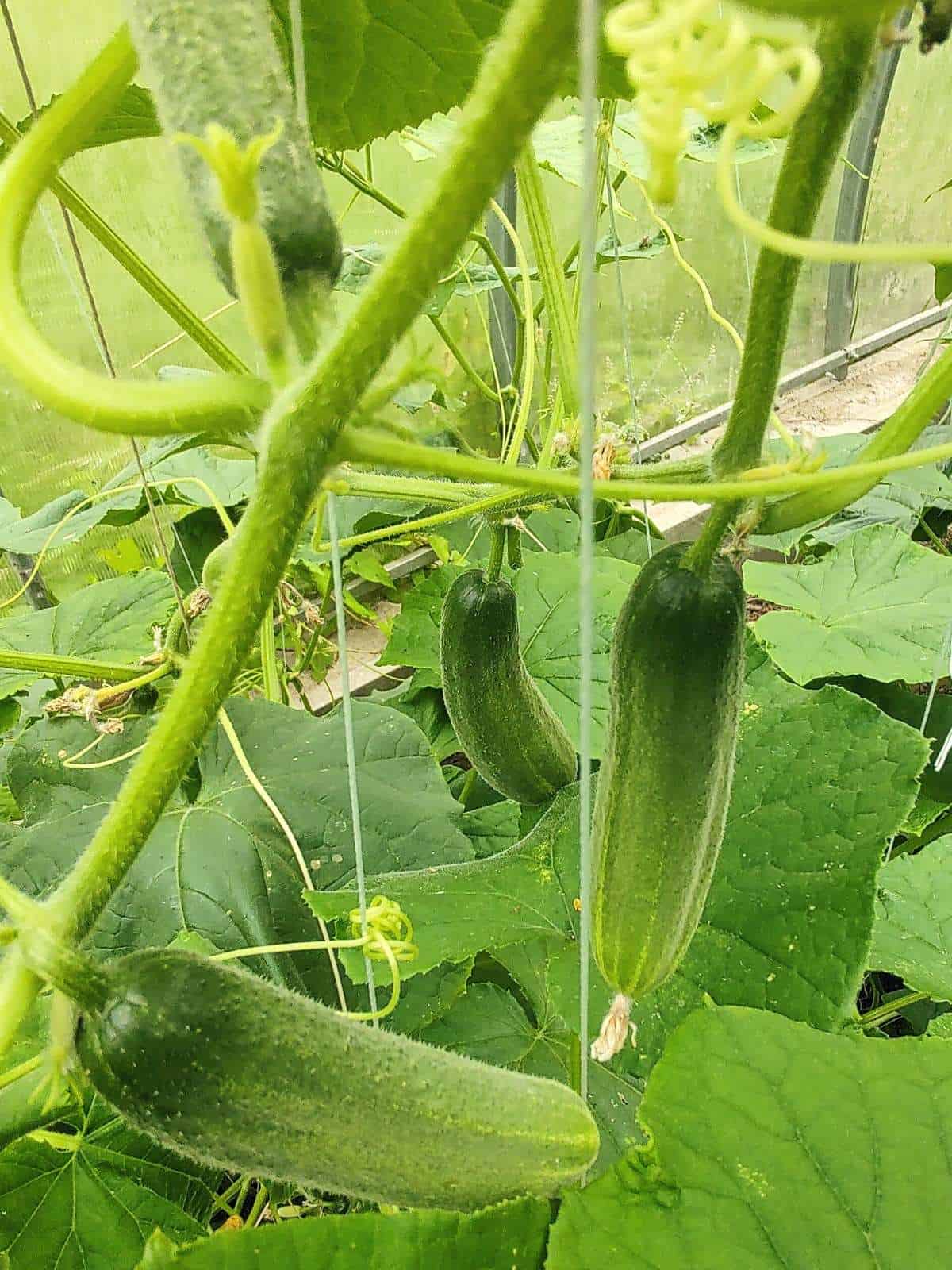
Cucumbers are preserved whole and not sliced into smaller pieces. The cucumbers with a size of 2.1/2 to 5 inches are ideal for this recipe. More giant cucumbers would be harder to pack into jars and could preserve unevenly.
Cucumbers should be pickled as soon as possible after harvesting because they lose water and wilt quickly. Moreover, the pickles will be crunchier if you use fresh cucumbers!
➜ Ingredients for homemade pickles
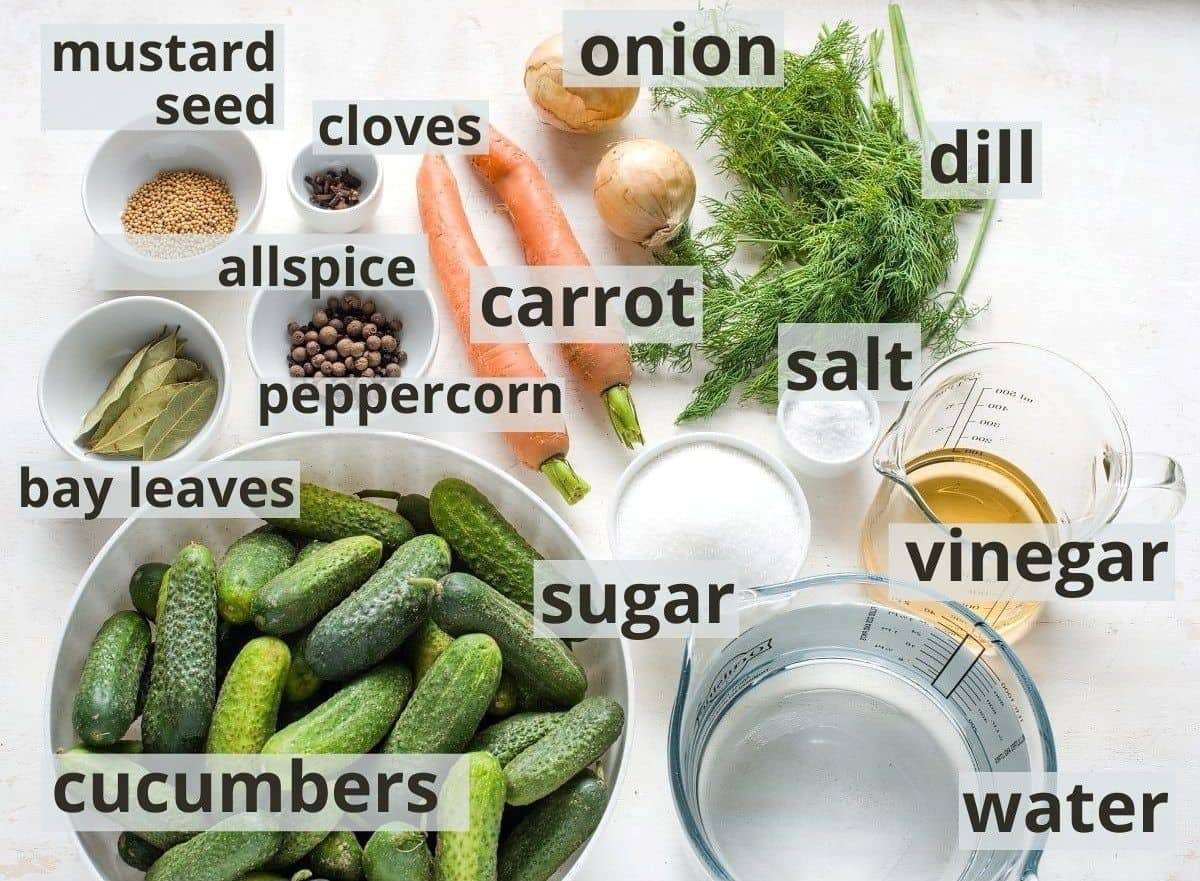
- Cucumbers for pickling; smaller cucumbers of 2 1/2-5 inches, the fresher after picking up, the better
Brine ingredients
Cook the brine for pickles ahead of time. Pour the brine into pickle jars while it is still warm.
- Water
- Salt
- Granulated sugar
- Vinegar; in the Czech Republic, we use sharp fermented vinegar with an acidity of 8%, while in the USA, white distilled vinegar with an acidity of around 5% is more common. In the recipe, I used Czech (yellow) vinegar. But below in the recipe card, you will find instructions for using distilled white vinegar with 5% acidity.
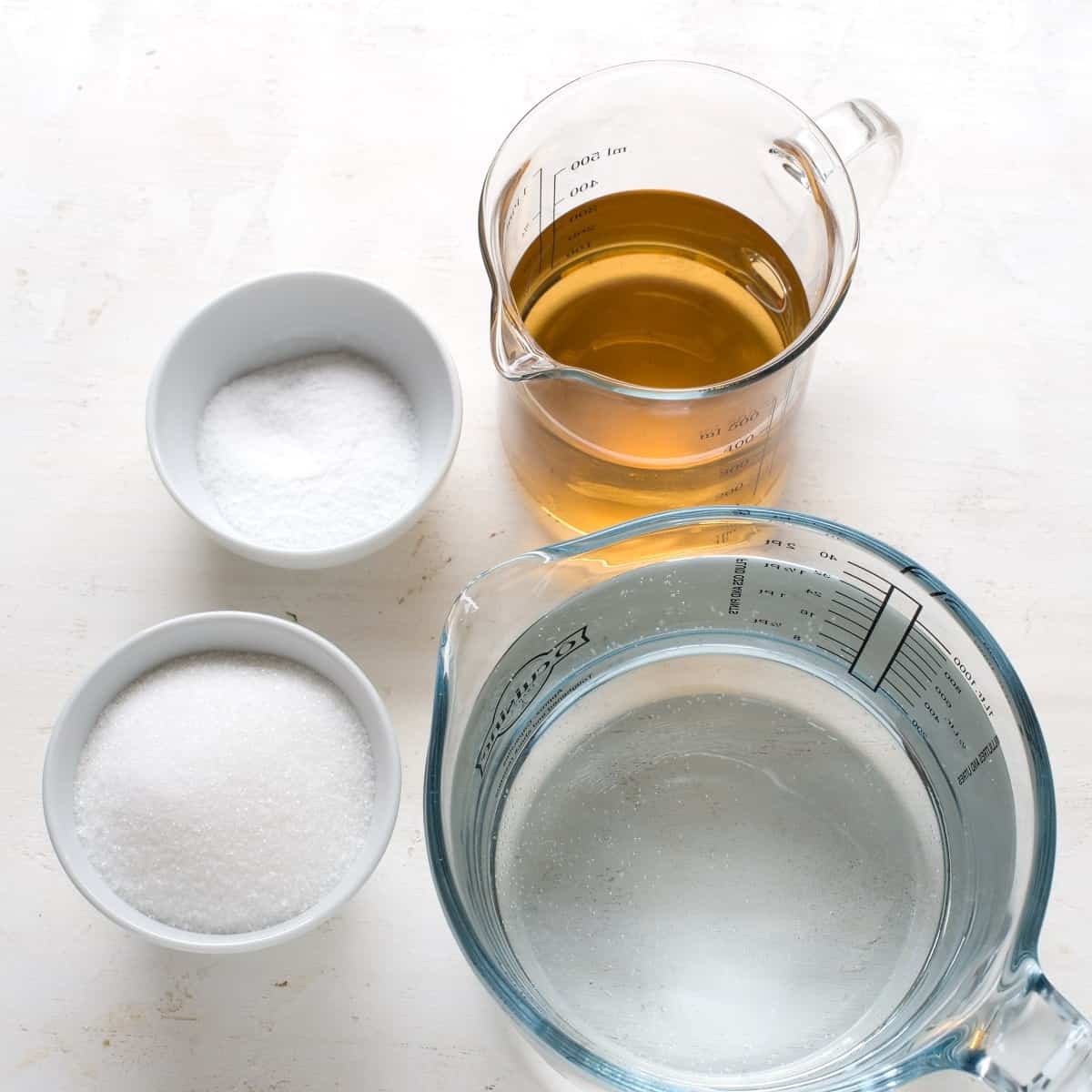
Herbs and spices
Czechs like many herbs, spices, and vegetable combinations that can be found in pickles. Some are required, whilst others are optional.
Essential:
- Fresh dill; you get the most dill flavor from the blooming dill head. Use the thick stems as well, not just the delicate green leaves.
- Onions; sliced into rings
- Carrot; sliced
- Allspice
- Peppercorn
Optional:
- Horseradish; sliced
- Bay leaf
- Mustard seed
- Hot peppers
- Peeled garlic cloves
- Cloves (spice)
✅ You’ll find the exact amount of ingredients below in the recipe card, which you can also print out.
➜ Useful canning tools
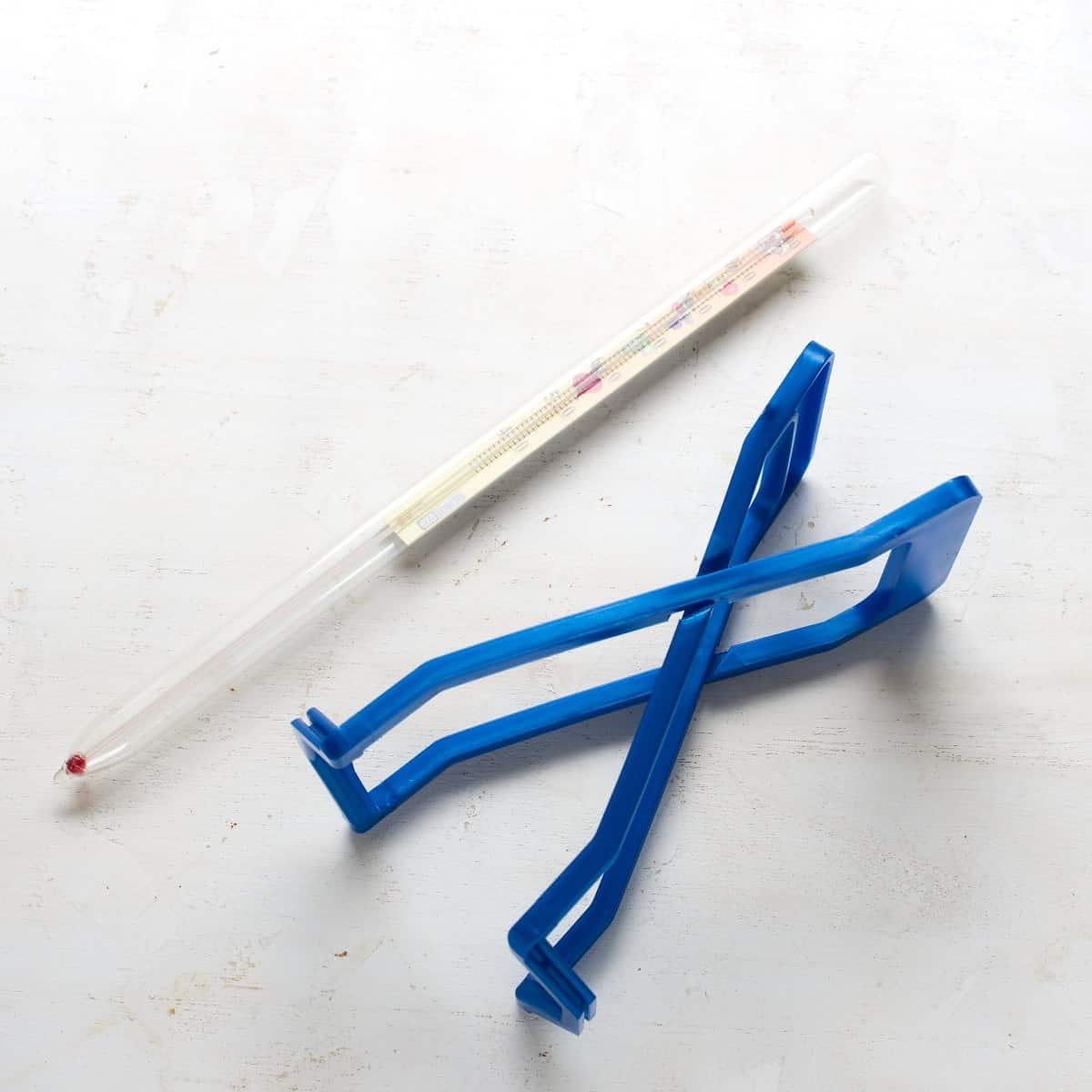
With the right equipment, canning is much easier, safer, and less daunting. What you'll need is as follows:
- 1 quart/32 ounces wide mouth jars; with lids
- Larger pot; or a water bath canner. I use my 8-quart stock pot.
- Jar lifter
- Canning thermometer
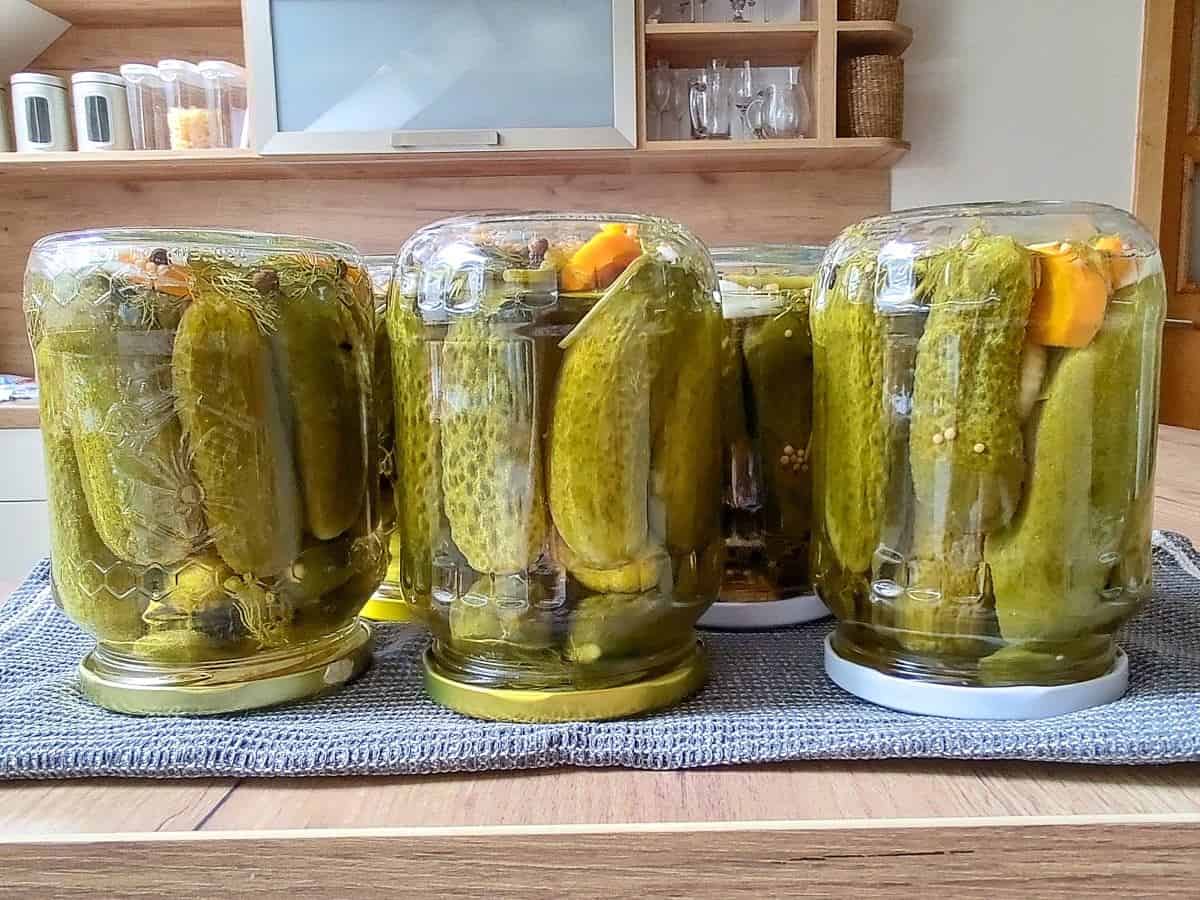
Brief overview of how to pickle cucumbers
- Wash the cucumbers thoroughly.
- Wash the jars and lids well.
- Place the spices and herbs in the bottom of the jars.
- Pack the cucumbers into the jars upright.
- Boil water in a large pot for a canning bath. Place a dish towel on the pot’s bottom.
- Cook the pickle brine.
- Pour the hot brine over the jars of cucumbers, and seal them with lids.
- Place the jars in a water bath and sterilize at 185°F/85°C for 20 minutes.
➜ Detailed instructions with photos
✔️ Wash the cucumbers
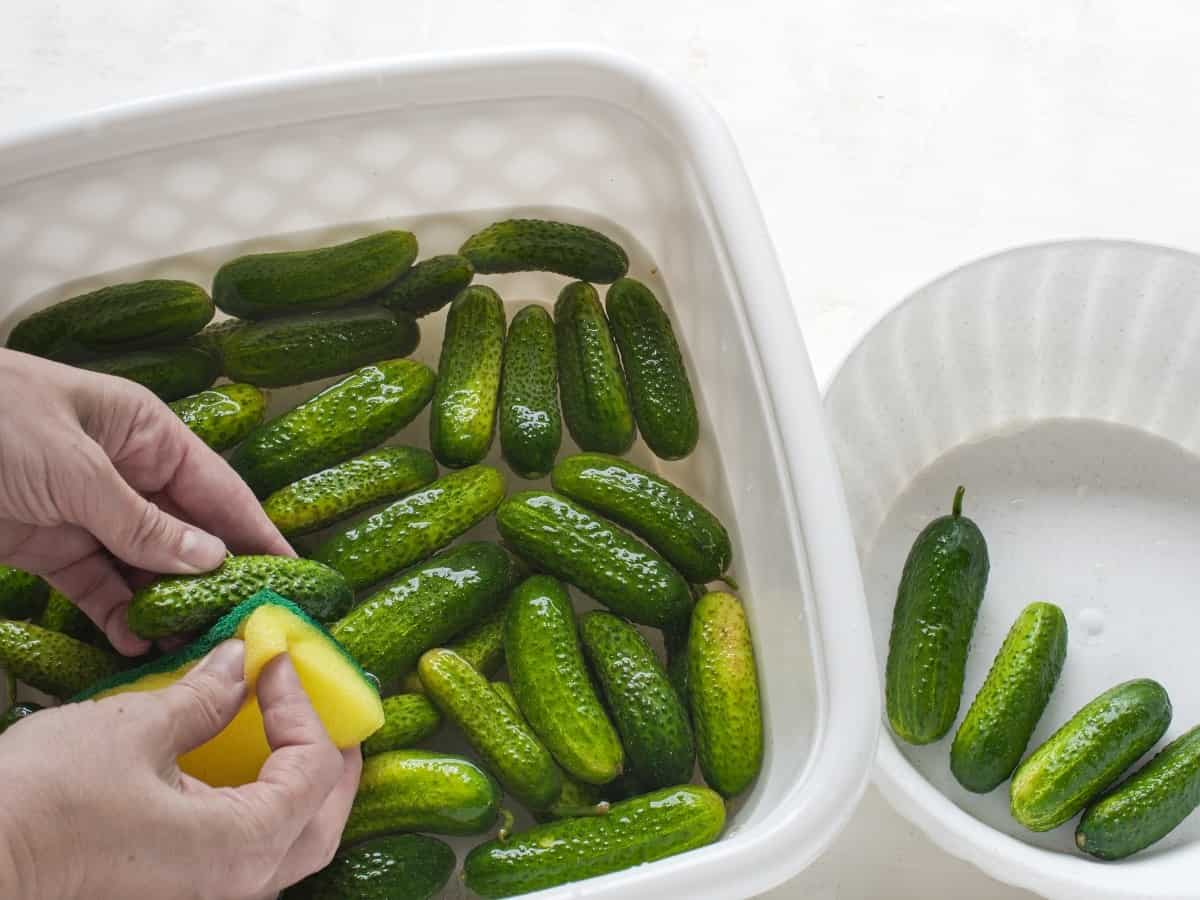
Place the cucumbers in a plastic tray, cover with lukewarm water and leave to stand for an hour to release the dirt and other impurities. Scrub with a sponge and rinse with clean water. Remove the remaining cucumber stem if there is one.
✔️ Prepare the canning jars
1-quart wide mouth jars with a screw cap are best for pickling cucumbers. Wash the jars and lids thoroughly in soapy water or the dishwasher.
✔️ Fill the jars
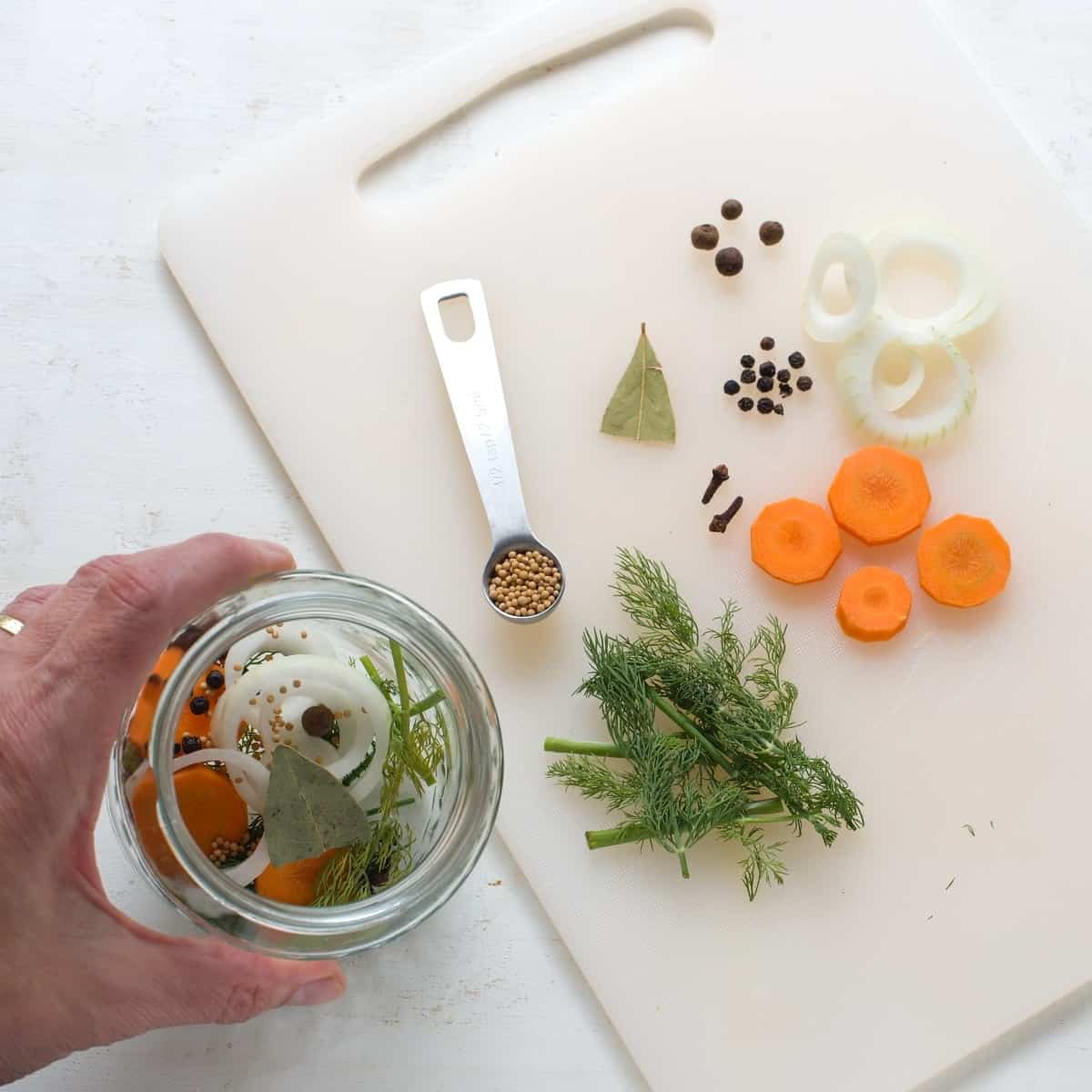
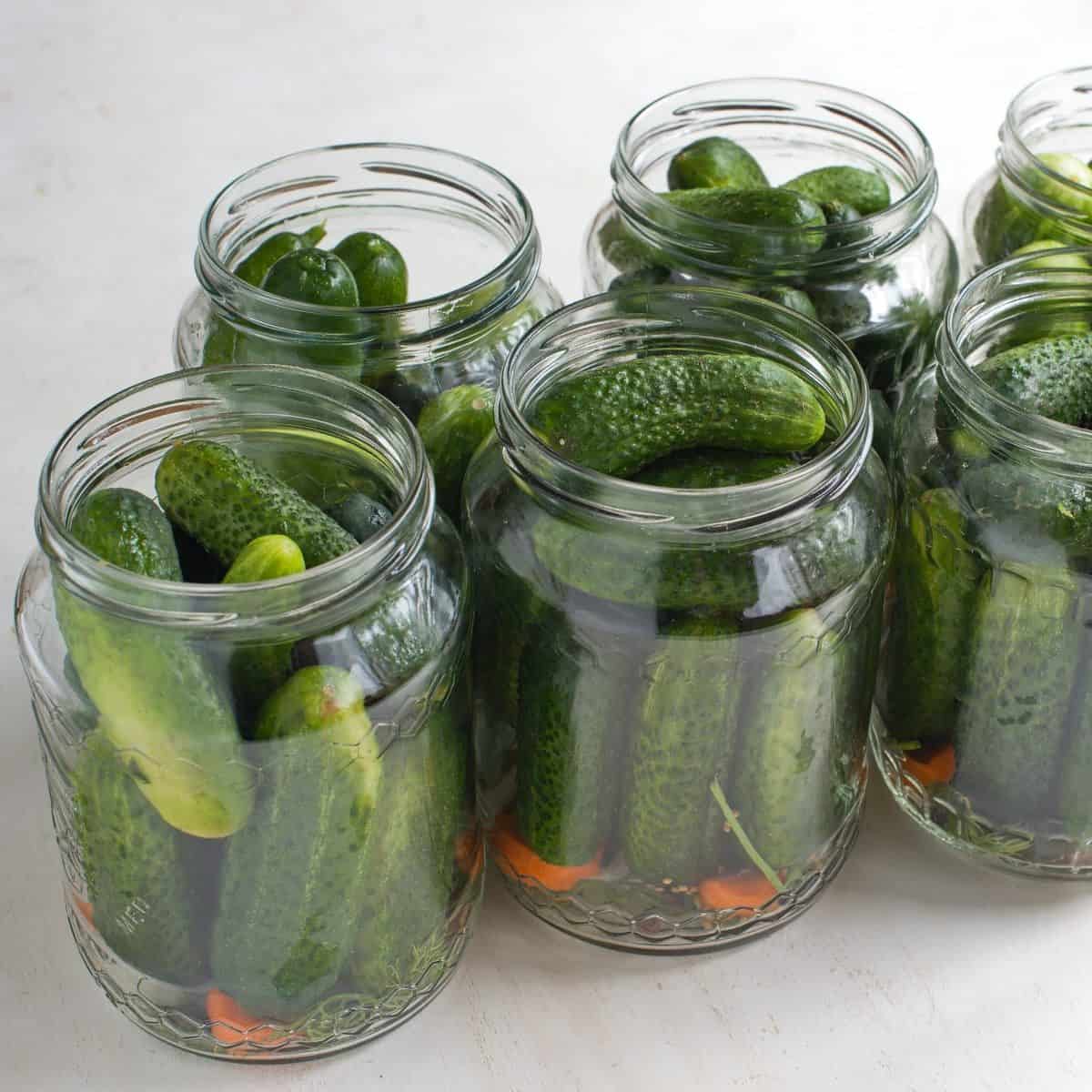
Place a few fresh dill sprigs in each jar's bottom, including the thick stems. Add onion rings, carrots, allspice, and peppercorn. Stuff the jars tightly with cucumbers. The cukes will shrink and float in the brine when sterilized. Start with more giant cucumbers around the perimeter, then fill in the gaps with smaller pickles.
If you have leftover dill, put it on top of the cucumbers.
✔️ Boil water for canning in a water bath
Pour water into a canning pot and bring it to a boil. Carefully place a tea towel on the bottom to prevent the jars from cracking when sterilizing or handling.
✔️ Cook a pickle brine
In a saucepan, boil water with sugar and salt. When dissolved, remove from the stove and stir in the vinegar. Ladle hot pickling brine over the filled jars leaving about 1/2 inch head space.

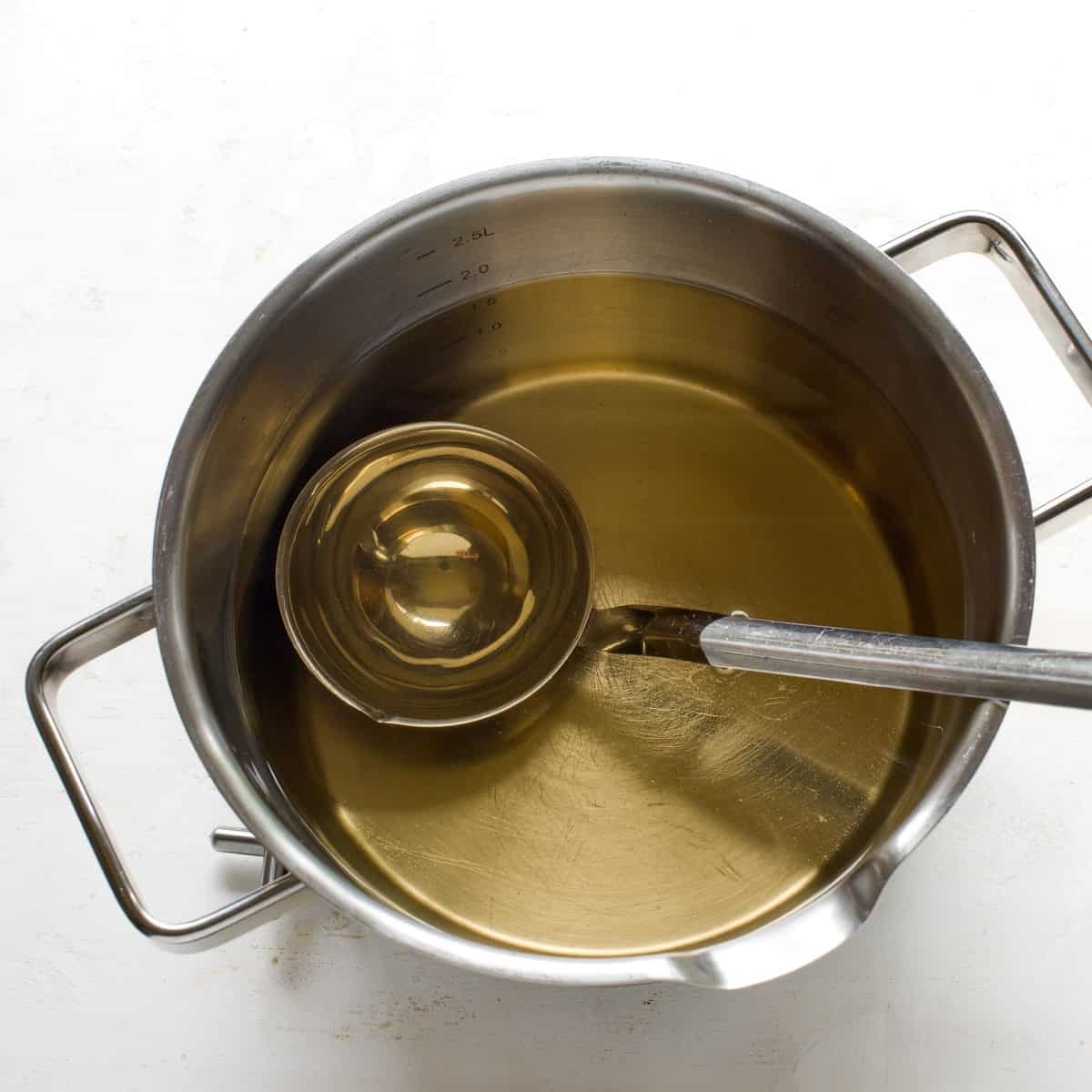
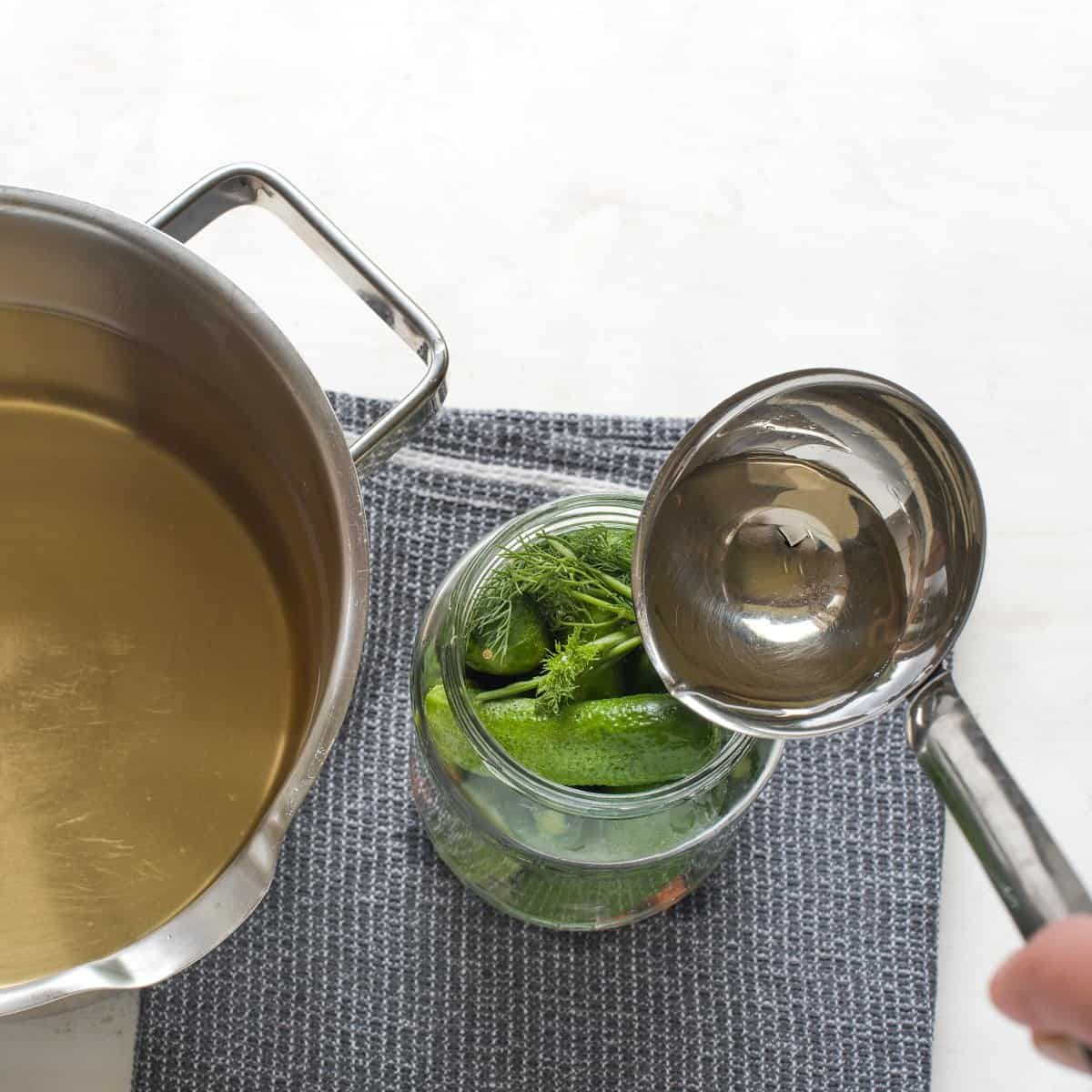
✔️ Sterilization
Seal the jars of pickles with lids and tighten them.
Keep the water temperature in the pot with a water bath at around 185°F/85°C; I am using a canning thermometer. Preferably using a pair of tongs, carefully insert the jars into the pot of water so that they do not touch each other. The water level in the pot should reach about 1 inch below the lid.
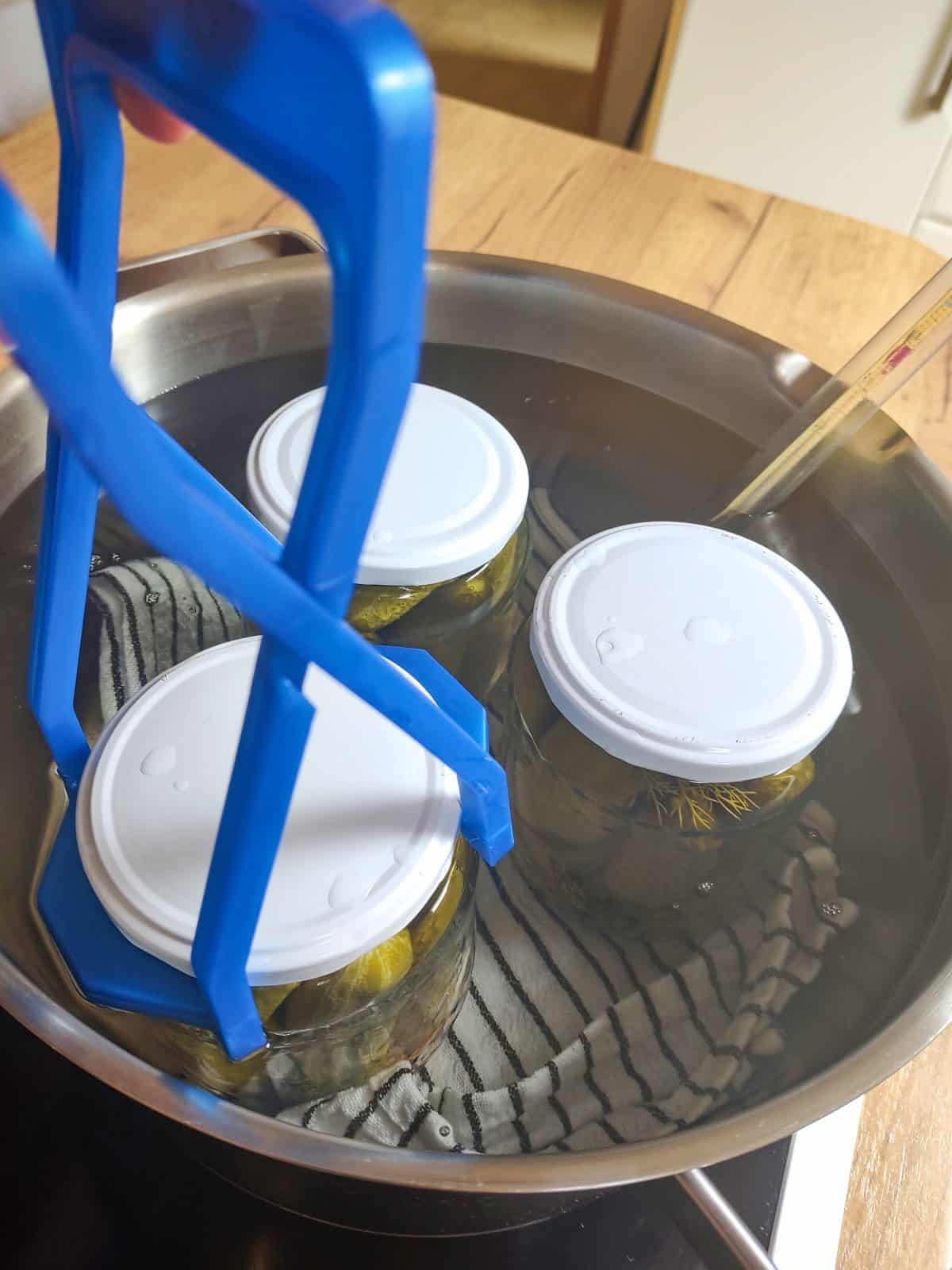
Sterilize for 20 minutes. Then remove the jars with pickles using the lifting tongs, and flip them lid side down onto a folded kitchen towel or another heat-proof surface. Let the jars cool completely. Careful, they are hot when taken out of the water bath!

TIP: The next day, push down on the middle of the lid to ensure that the seal has formed. The lid should not move up and down; no clicking or popping sounds should be made. If no seal forms, refrigerate pickles and consume them within one week.
➜ What to serve dill pickles with?
Pickled cucumbers go great as a garnish to Czech classics: pork schnitzel, Dutch schnitzel, or meatloaf. They are indispensable in potato salad, homemade tartar sauce, or a topping on famous Czech open-faced sandwiches.
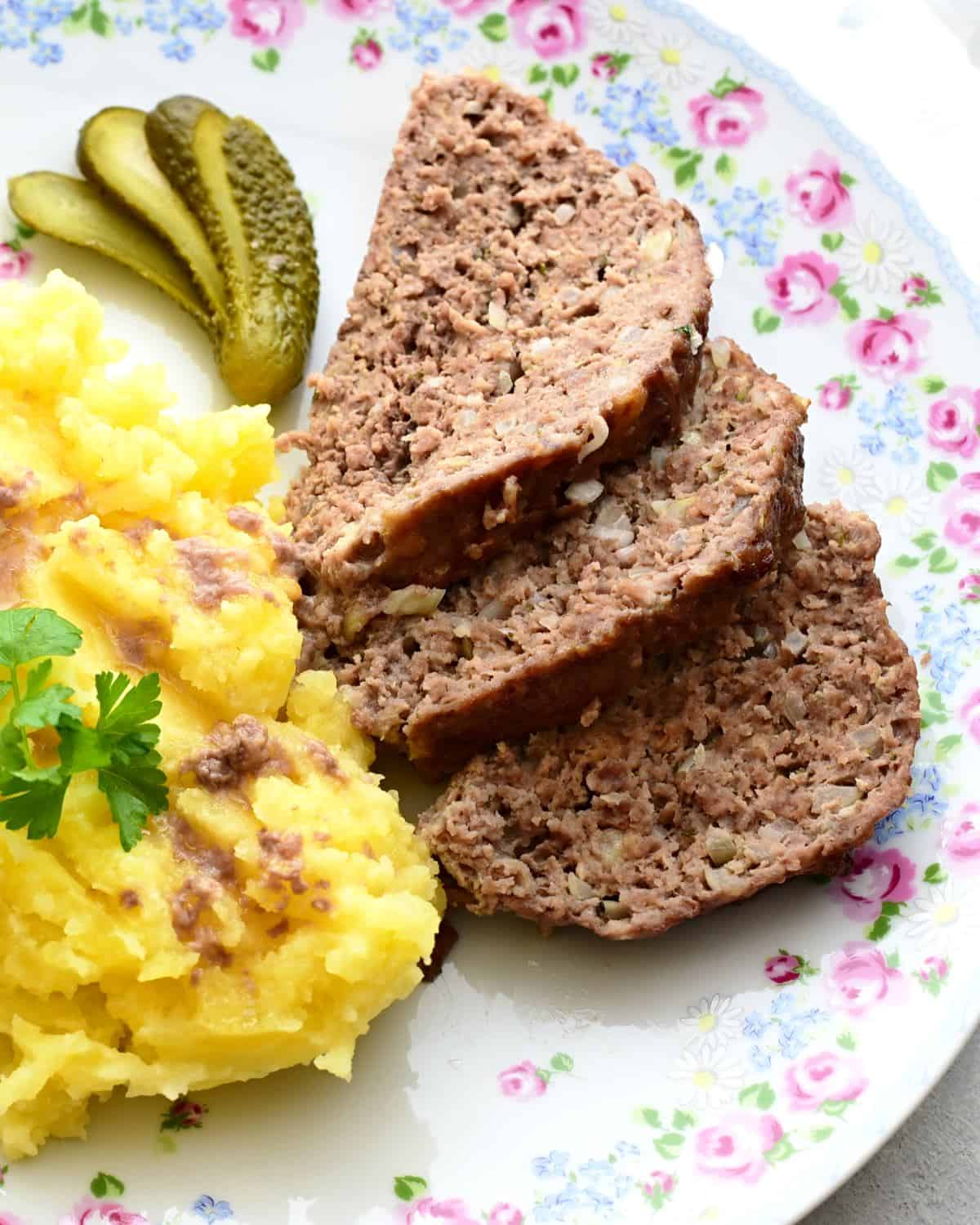
TIP: Let the pickles sit for about three weeks before opening and digging in so that they can soak up the brine thoroughly.
➜ How long will homemade canned pickles last
Store the jars of dill pickles in the pantry in a dark, dry place at room temperature. Stored this way, they will keep for a year without any problems.
Once you have opened the jar of pickles, store it refrigerated and use it within a week.
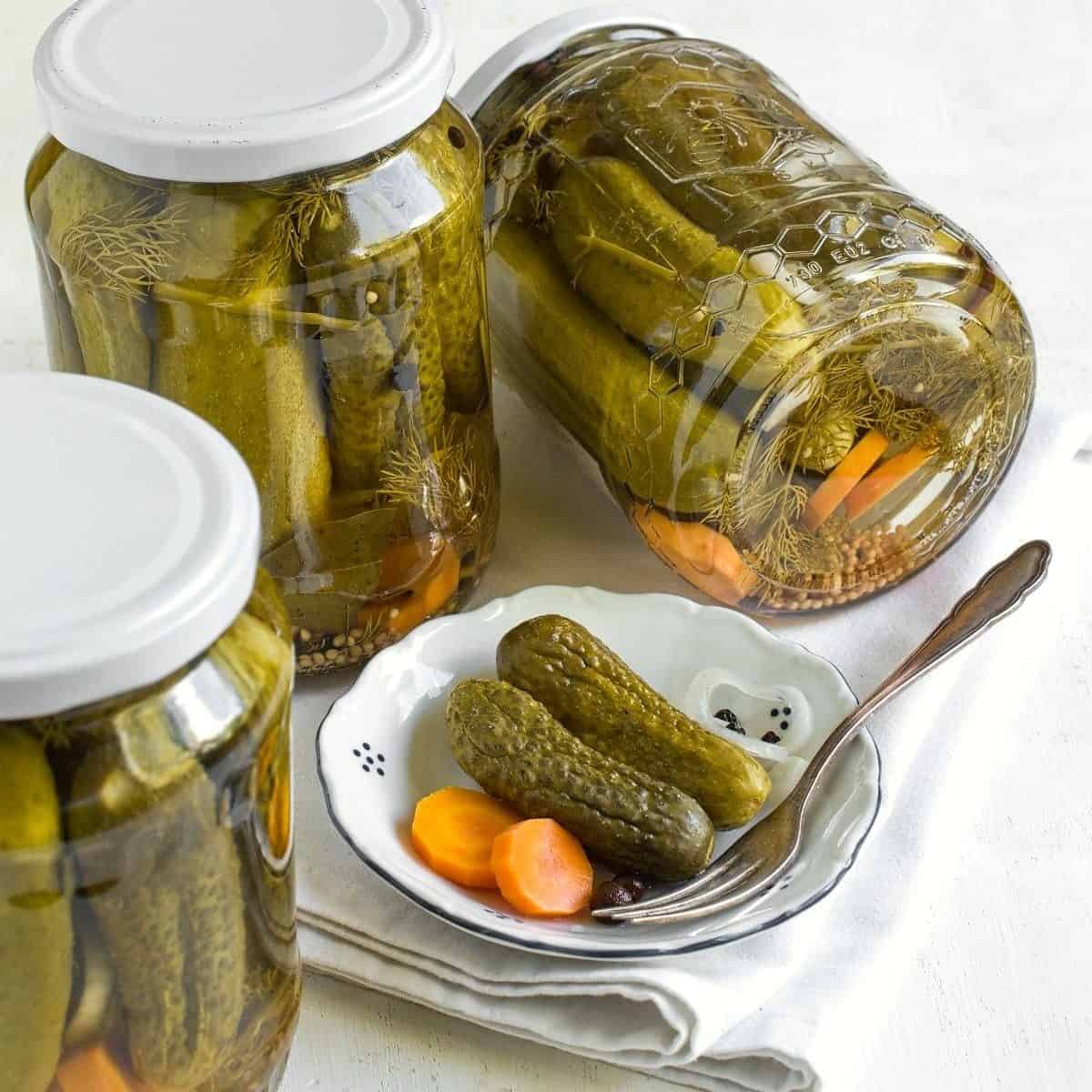
➜ Quick questions and answers
Classic pickling cucumbers are about 2 1/2-5 inches in size. Freshly harvested cucumbers are best, as they lose moisture quickly after picking and become wilt; moreover, they would not be as crunchy when sterilized.
One 1-quart wide-mouth jar will hold about 1-1 1/4 pounds of cucumbers. The larger the cucumbers, the less will fit in the jar. Small cucumbers, on the other hand, will require a greater quantity.
Next, count on about 1 1/2 cups of brine per jar. Again, more giant cucumbers need more pickling solutions because there will be more spaces between them.
Jars immersed in water need a processing time of 20 minutes at a water bath temperature of 185°F/85°C. This method gives the right crispiness to pickles, and they will be beautifully crunchy with firm flesh and not mushy.
More delicious recipes:
- Pickled sausages – Czech utopenci
- Flaky cheese hearts
- Garlic cheese spread
- Roasted pork knuckle
- Creamy cucumber salad with garlic
Tried this recipe?
Leave a review down in the comments! ⭐⭐⭐⭐⭐
Follow me on Facebook and Pinterest. Subscribe to my newsletter. Send me any question about Czech cuisine to my e-mail. I love hearing your feedback!
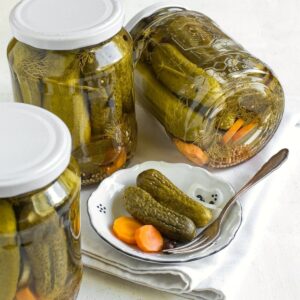
Homemade Dill Pickles (Czech Recipe)
Equipment
- 4 1-quart mouth wide jars with rings and new lids
- 1 large stock pot for water bath
- 1 jar lifter
- 1 canning thermometer
Ingredients
- 4 pounds pickling cucumbers (1,8 kg) size 2 1/2-5 inches
Pickling brine:
- 3 ½ cups water (850 ml)
- 2 ½ cups distilled white vinegar (600 ml) 5% acidity
- ¾ cup granulated sugar (150 g)
- 2 Tablespoons salt (35 g)
Herbs and spices:
- 16 allspice (4 per jar)
- 32 peppercorn (8 per jar)
- 4 full dill stems (1 per jar) cut into 2-inch pieces
- 8 cloves (2 per jar) optional
- 16 pieces of sliced carrot (4 per jar)
- 16 onion rings (4 per jar)
- 4 bay leaves (1 per jar)
Instructions
- Washing cucumbers: Place the cucumbers in a plastic tray, cover with lukewarm water and leave to stand for an hour to release the dirt and other impurities. Scrub with a sponge and rinse with clean water. Remove the remaining cucumber stem if there is one.
- Prepare canning jars: 1-quart wide mouth jars with a screw cap are best for pickling cucumbers. Wash the jars and lids thoroughly in soapy water or in the dishwasher.
- Fill the jars: Place a few fresh dill sprigs including the thick stems, onion rings, carrots, allspice, and peppercorn in the bottom of each jar. Stuff the jars tightly with cucumbers. The cukes will shrink and float in the brine when sterilized. Start with larger cucumbers around the perimeter, then fill in the gaps with smaller pickles. If you have any dill left over, put it on top of the cucumbers.
- Boil water for canning in a water bath: Pour water into a canning pot and bring it to a boil. Carefully place a tea towel on the bottom to prevent the jars from cracking when sterilizing or handling.
- Cook pickling brine: In a saucepan, boil water with sugar and salt. When dissolved, remove from the stove and stir in the vinegar. Ladle hot pickling brine over the filled jars leaving about ½ inch head space.
- Sterilization: Screw the jars of pickles in and tighten. Keep the water temperature in the pot at around 185°F/85°C (I am using a canning thermometer). Preferably using a pair of tongs, carefully insert the jars into the pot of water so that they do not touch each other. The water level in the pot should reach about 1 inch below the lid.
- Sterilize for 20 minutes. Then remove the jars with pickles using the lifting tongs, flip them lid side down onto a folded clean kitchen towel or other heat proof surface and let the jars cool completely. Careful, they are hot when taken out of the water bath!
Notes
- Makes four full 1-quart jars of pickles.
- The next day after pickling, push down on the middle of the lid to ensure that the seal has formed. The lid should not move up and down; no clicking or popping sounds should be made. If no seal forms, refrigerate pickles and consume them within one week.
- Let the pickles sit for about three weeks before opening and digging in to soak up the brine thoroughly.
- STORAGE: Store the jars of dill pickles in the pantry in a dark, dry place at room temperature. Stored in this way, they will keep for a year without any problems. Once you have opened the jar of pickles, store it refrigerated and use it within a week.
DISCLAIMER: Because I come from Central Europe, my recipes are based on metric units such as grams or milliliters. Check out how I convert metric units to the U.S. system:
Conversion chart

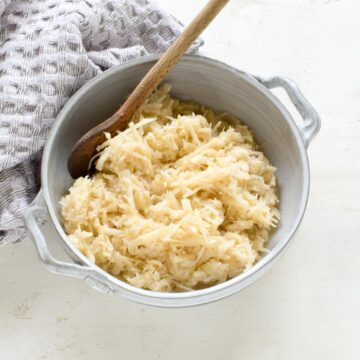
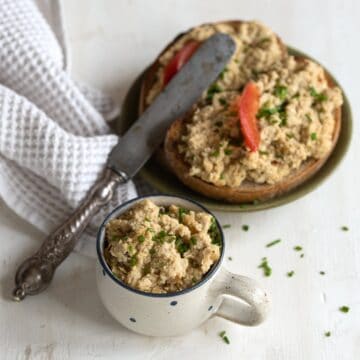
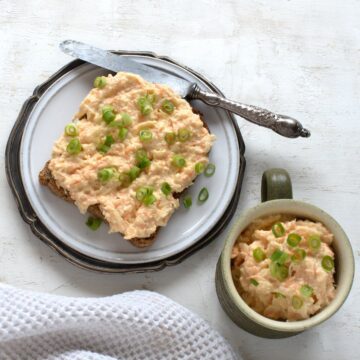
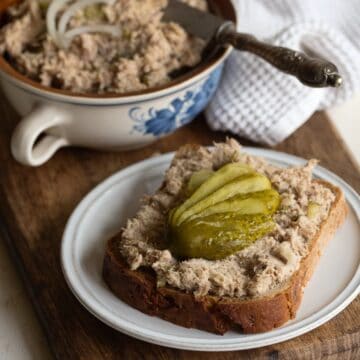
Angela
If I have a higher acid vinegar, do I adjust the amount of vinegar or sugar used to compensate? I have a polish 10% vinegar
Petra Kupská
You definitely need to adjust the amount of vinegar if its acidity is different.
For example, in the Czech Republic, we usually use 8% vinegar, but I bought a milder apple cider vinegar with 5% acidity for this recipe.
Having 10% vinegar in your case, I would use a ratio of 1:3, which means 1 part vinegar to 3 parts water.
Specifically, I would use 1.75 cups of 10% vinegar and 5.25 cups of water for this recipe. Keep the other ingredients for the brine (salt, sugar) unchanged.
Hope this helps!